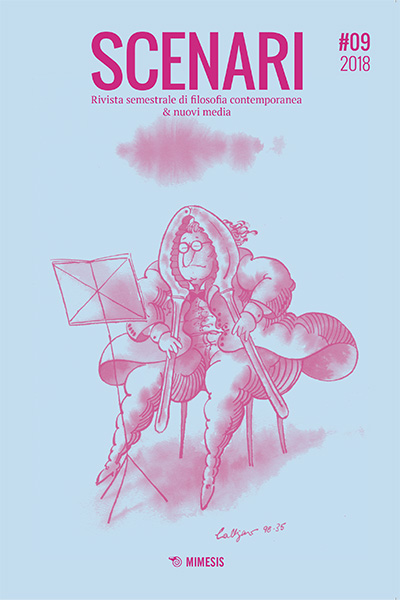Autorizzazione del Tribunale di Milano n. 24 del 30 gennaio 2015.
9788857555607
2420-8914
Biannual
Filosofia contemporanea
Double-blind peer review
“Scenari” is a double-blind peer reviewed journal committed to upholding the highest standards of publication ethics. The journal follow the COPE’s Best Practice Guidelines for Journal Editors and the COPE’s Ethical Guidelines for Peer Reviewers, basing its guidelines on existing Elservier policies.
Author’s duties
Authors of reports of original research should present an accurate account of the work performed as well as an objective discussion of its significance. Authorship should be limited to those who have made a significant contribution to the conception, design, execution or interpretation of the reported study.
Authors must make sure that the submitted article is original, is not wholly or in part a re-publication of the author’s earlier work, and contains no fraudulent data. They also need to ensure that the submitted article is the work of the submitting author(s) and is not plagiarized, wholly or in part. Re-use of text, data, figures, or images without appropriate acknowledgment or permission is considered plagiarism, as is the paraphrasing of text, concepts, and ideas. All allegations of plagiarism are investigated thoroughly and in accordance with COPE guidelines.
It is the responsibility of the authors to ensure that all authors that contributed to the work are fairly acknowledged and that the published author list accurately reflects individual contributions.
Authors must check that all copyrighted material within the article has permission for publication and that material for which the author does not personally hold copyright is not reproduced without permission.
Authors should ensure that the manuscript submitted is not currently being considered for publication elsewhere.
The references made in a manuscript or article to another person’s work or idea must be credited appropriately.
Authors should ensure that all authors provide retractions or corrections of mistakes.
Peer review and reviewer’s duties
The publication of an article in a peer-reviewed journal is an essential building block in the development of a coherent and respected network of knowledge. It is a direct reflection of the quality of the work of the authors and the institutions that support them. Peer-reviewed articles support and embody the scientific method. It is therefore important to agree upon standards of expected ethical behaviour for all parties involved in the act of publishing: the author, the journal editor, the peer reviewer, the publisher and the society.
Referees are selected according to their expertise in their particular fields.
Both the referee and the author remain anonymous throughout the “blind” review process.
Referees have a responsibility to be objective in their judgments; to have no conflict of interest with respect to the research, with respect to the authors and/or with respect to the research funders; to point out relevant published work which is not yet cited by the author(s); and to treat the reviewed articles confidentially.
Reviewers should identify relevant published work that has not been cited by the authors. Any statement that an observation, derivation, or argument had been previously reported should be accompanied by the relevant citation. A reviewer should also call to the editor’s attention any substantial similarity or overlap between the manuscript under consideration and any other published paper of which they have personal knowledge.
Editor’s duties
The editor of a peer-reviewed journal is responsible for deciding which of the articles submitted to the journal should be published, often working in conjunction with the relevant society. The validation of the work in question and its importance to researchers and readers must always drive such decisions.
The editor may be guided by the policies of the journal’s editorial board and constrained by such legal requirements as shall then be in force regarding libel, copyright infringement and plagiarism.
The editor may confer with other editors or reviewers (or society officers) in making this decision, but he hold full authority:
- to reject/accept an article
- to accept a paper only when reasonably certain,
- to promote publication of corrections or retractions when errors are found
- to preserve anonymity of reviewers
- to have no conflict of interest with respect to articles they reject/accept.
If an editor feels that there is likely to be a perception of a conflict of interest in relation to their handling of a submission, they will declare it to the other editors.
Conflict of interest
Potential conflicts of interest should be disclosed at the earliest stage possible.
Conflict of interest exists when an author’s private interests might be seen as influencing the objectivity of research or experiment, to the point that a reasonable observer might wonder if the individual’s behaviour or judgement was motivated by considerations of his or her competing interests. It is the responsibility of a manuscript’s corresponding author to confirm if co-authors hold any conflict of interest. The corresponding author may be required to co-ordinate completion of written forms from each co-author and submit these to the editor or journal administrator prior to acceptance.
All authors should disclose in their manuscript any financial or other substantive conflict of interest that might be construed to influence the results or interpretation of their manuscript. All sources of financial support for the project should be disclosed.
Publishing ethics issues
Members of the Editorial Board ensure the monitoring and safeguarding of the publishing ethics. This comprises the strict policy on plagiarism and fraudulent data, the strong commitment to publish corrections, clarifications, retractions and apologies when needed, and the strict preclusion of business needs from compromising intellectual and ethical standards.
Whenever it is recognized that a published paper contains a significant inaccuracy, misleading statement or distorted report, it will be corrected promptly. If, after an appropriate investigation, an item proves to be fraudulent, it will be retracted. The retraction will be clearly identifiable to readers and indexing systems

La rivista attualmente è presente nell'elenco delle riviste scientifiche per l'area 11 dell'Agenzia Nazionale di Valutazione del Sistema Universitario e della Ricerca (ANVUR) ai fini dell'Abilitazione Scientifica Nazionale.
Conservatorio di Venezia
Pianista jazz e compositore, dopo una laurea in Filosofia con Enzo Paci e aver insegnato alcuni anni nei licei, si è dedicato al jazz realizzando finora 30 dischi a suo nome di cui almeno sei (Samadhi, Reflections, Pianure, Terras do risco, Trio in New York, Mysterious) hanno avuto importanza nella definizione di una via italiana al jazz fatta di lirismo, introspezione e collegamenti con altre culture. Ha collaborato con importanti musicisti come Steve Swallow, Barre Phillips, Bill Elgart Ralph Alessi, Mat Maneri, John Hebert, Furio Di Castri, Giulio Visibelli, Bruce Ditmas. Molto attivo nella didattica jazzistica, ha pubblicato diversi libri fra critica e autobiografia: Il profumo del jazz (1996), Paul Bley, la logica del caso (2004), tradotto in inglese per la Vehiculepress di Montreal, La filosofia di Monk (2014) con Giacomo Franzoso, e Le avventure di un jazzista-filosofo (2016). Attualmente è docente principale di Piano e composizione jazz al Conservatorio di Venezia.
A Contact with the Unknown
The ability to lead us beyond our limits, into the unknown, is a key aspect of jazz improvisation. Hence the accompanying feeling of happiness. However, for this to occur the players of this dialogue must put aside their ego and quest for personal success. It is only by leaving aside our ego and finding our “us” again, that jazz can find its feminine side, the result of a continuous attention towards the other and, at the same time, the naturalness and spontaneity of playing. By rediscovering this impossible naturalness, jazz improvisation draws closer to its true purpose, that is to do away with censorship, and reveals its real essence, a never-ending discourse, all inconclusive, not enclosed within a code, and inspires a true revolution in education and in teaching.
Keywords: jazz, freedom, the unknown, improvisation, happiness.

Università di Belgrado
Università di Bologna
Università di Udine
Luca Taddio è stato docente a contratto di Estetica presso l’Università di Udine, Trieste e Ferrara. Si occupa in particolare di filosofia della percezione e di teoria dell’immagine. Ha pubblicato i seguenti libri: Spazi immaginali (2004), Fenomenologia eretica (2011), L’affermazione dell’architettura (con Damiano Cantone, 2011), Global Revolution (2012), I due misteri (2012), Verso un nuovo realismo (2013).